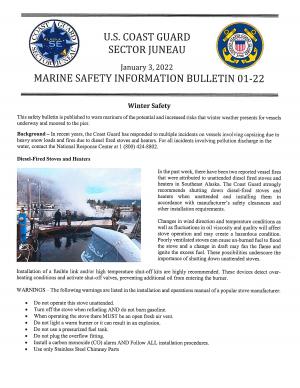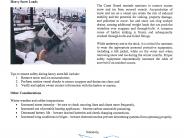U. S. Coast Guard Marine Safety Information Bulletin
The attached safety bulletin is published to warn mariners of the potential and increased risks that winter weather presents for vessels underway and moored to the pier.
Background - In recent years, the Coast Guard has responded to multiple incidents on vessels involving capsizing due to heavy snow loads and fires due to diesel fired stoves and heaters. For all incidents involving pollution discharge in the water, contact the National Response Center at 1 (800) 424-8802.
Diesel-Fired Stoves and Heaters
In the past week, there have been two reported vessel fires that were attributed to unattended diesel fired stoves and heaters in Southeast Alaska. The Coast Guard strongly recommends shutting down diesel-fired stoves and heaters when unattended and installing them in accordance with manufacturer's safety clearances and other installation requirements.
Changes in wind direction and temperature conditions as well as fluctuations in oil viscosity and quality will affect stove operation and may create a hazardous condition. Poorly ventilated stoves can cause un-bumed fuel to flood the stove and a change in draft may fan the flame and ignite the excess fuel. These possibilities underscore the importance of shutting down unattended stoves.
Installation of a fusible link and/or high temperature shut-off kits are highly recommended. These devices detect over heating conditions and activate shut-off valves, preventing additional oil from entering the burner.
WARNINGS - The following warnings are listed in the installation and operations manual of a popular stove manufacturer:
- Do not operate this stove unattended.
- Tum off the stove when refueling AND do not bum gasoline.
- When operating the stove there MUST be an open fresh air vent.
- Do not light a warm burner or it can result in an explosion.
- Do not use a pressurized fuel tank.
- Do not plug the overflow fitting.
- Install a carbon monoxide (CO) alarm AND Follow ALL installation procedures.
- Use only Stainless Steel Chimney Parts
Recommendations - The Coast Guard recommends the following actions for vessels with installed diesel-fired stoves and heaters:
- Inspect stove components and verify installation is in accordance with owner's manual.
- Test the draft on your stove in accordance with owner's manual.
- Clean the stove or heater's internal and external surfaces and burner in accordance with owner's manual.
- Follow fuel maintenance checklist in owner's manual as well as clean fuel line and replace fuel filters if necessary.
- Ensure all fire protection and detection systems, including portable fire extinguishers, are properly maintained and installed.
Heavy Snow Loads
The Coast Guard reminds mariners to remove excess snow and ice from moored vessels. Accumulation of snow and ice on a vessel can create the risk of reduced stability and the potential for sinking, property damage, and pollution to occur. Ice and snow can clog cockpit drains, causing additional weight loads that can push the waterline over scuppers and through-hulls. A common cause of harbor sinking is frozen and subsequently cracked through-hulls and failed fittings.
While underway and at the dock, it is critical for mariners to wear the appropriate personal protective equipment, including a life jacket, while on the water and when removing snow and ice during the winter months. Proper safety equipment exponentially increases the odds of survival if an incident occurs.
Tips to ensure safety during heavy snowfall include:
Remove snow and ice accumulation;
Perform routine vessel checks to ensure scuppers and drains are clear; and
Verify and update owner contact information with the harbor or marina.
Other Considerations
Winter weather and colder temperatures:
Increased storm intensity - be sure to check mooring lines and cleats more frequently.
Increased use of portable heating appliances - beware carbon monoxide poisoning.
Decreased battery life - beware drained batteries and check charging connections.
Increased icing conditions in bilges - beware obstructions that prevent dewatering systems from operating properly.
Sincerely,
Captain, U.S. Coast Guard
Captain of the Port, Southeast Alaska


